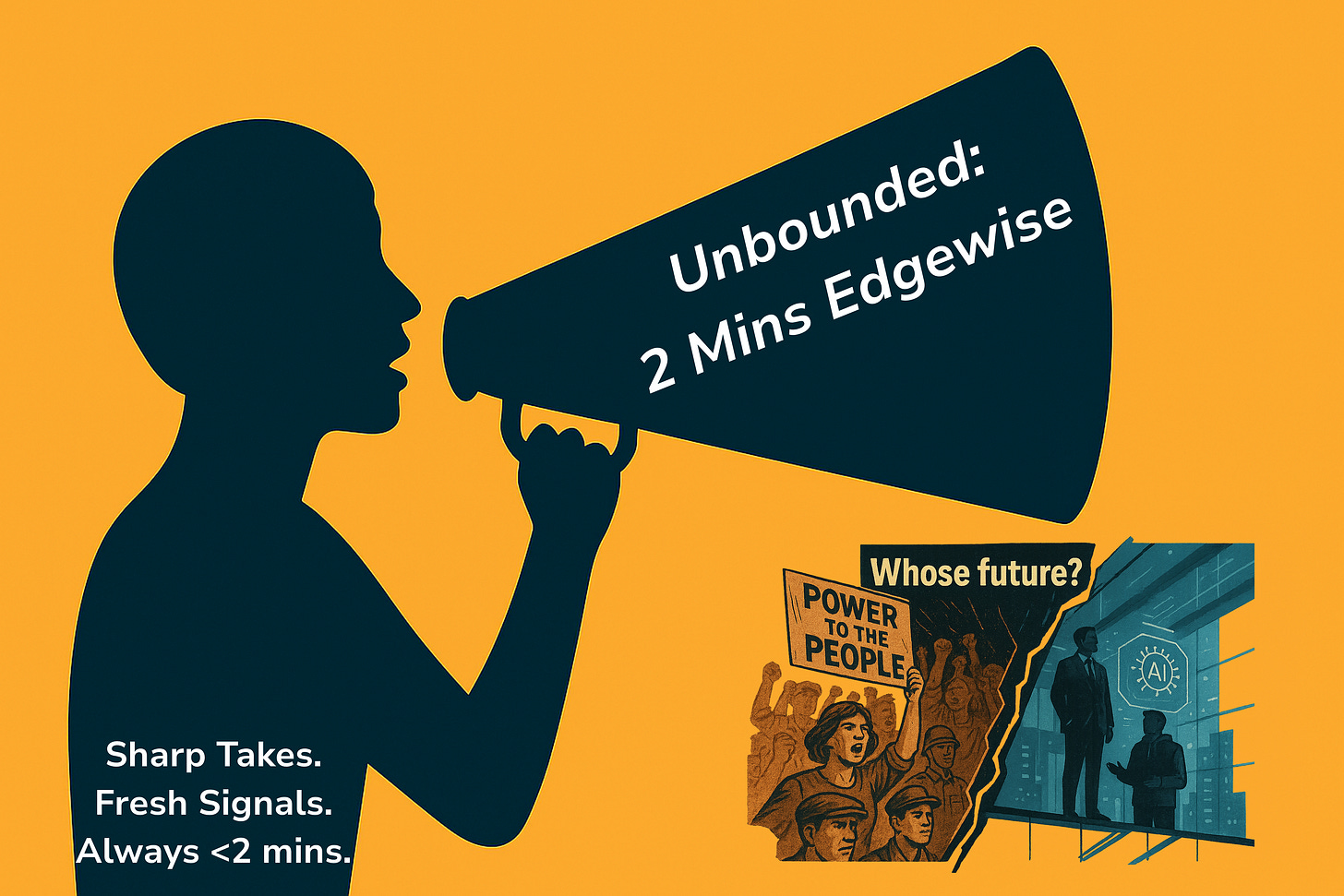A People’s History of the Tech Revolution
< Unbounded: 2 Mins Edgewise
Unbounded: 2 Minutes Edgewise delivers sharp, fast takes on current events, fresh revelations, and just cool things. Provocative or hopeful or fiery — it will always be brief, always grounded, and always unbounded.
The prevailing narratives around today’s technological transformation – the Fourth Industrial Revolution – have been captured and monopolised by wealthy techno-elites.
Listening to them, you’d be forgiven for thinking the future is already written: that AI, surveillance, and algorithmic governance are simply the next logical steps in our future, stewarded by the “smartest (mostly Anglo, mostly American) minds” in Silicon Valley.
But what if that’s just the story techno-elites want us to believe? So that it becomes the history we will have?
Lately, I’ve been drawn to the concept of people’s history (also referred to as history-from-below), a way of explaining and analysing the past by centering the experiences of ordinary, disenfranchised, and marginalised people. These histories shift the focus away from powerful elites and toward grassroots movements, acts of resistance, and collective efforts by people to shape society and history from the bottom up — or, ahem, from the margins in.
In that vein, I recently finished reading A People’s History of the Portuguese Revolution by Raquel Varela. It tells the history of a real grassroots revolution in 1974-1975 — led not by elites, but by workers, soldiers, and citizens. For a brief moment, Portugal experimented with new ideas, workplace takeovers and neighborhood assemblies. It was a real experiment in radical democracy. But it was quickly shut down by a counter-revolution in November 1975. What followed — liberal, representative democracy — wasn’t the inevitable outcome of Portugal’s transition from António de Oliveira Salazar’s Estado Novo dictatorship. It was the result of class conflict, negotiation, and struggle.
Varela writes, “The term transition is ultimately unfit because it explains the “how” – a negotiation between ‘elites’, that is, agreement between leaders of the conflicting classes – without telling ‘why’ this came about, which ultimately cedes grounds of such negotiation to the individual will of the leaders.”
We risk making the same mistake with the technological revolution unfolding around us.
While this story is still being written, we fetishise big tech executives and we’re already too focused on what the millionaires and billionaires say – many of those on this or that Top List, at Davos, or buying speaking slots at multilateral conferences – rather than asking: how are these systems really being built, and on the backs of whom?
The truth is that today’s tech infrastructure is powered by extractive processes, exploiting both human labour and natural resources, especially from the global south. These systems are tested on vulnerable populations (often without consent), scaled without democratic oversight, and optimised to consolidate economic, political, and increasingly military power.
So what would it look like to write a people’s history of the tech revolution, as it unfolds, in real time?
It would mean centering the people who are most impacted by these technologies: the ordinary, disenfranchised, the marginalised in policy and governance discourse.
It would mean seeing them not as users or data subjects, but rather as citizens, organisers, and resistors, actively working to shape the systems that govern their lives.
It would mean treating tech governance not as an elite-only domain, but as a democratic struggle over what kind of tech-enabled future we want to sustain our human agency and flourishing — and who gets to decide.
Because like Portugal’s revolution, nothing about our technological future is inevitable — unless we surrender to the techno-elites.
AND *THAT* IS 2 MINUTES EDGEWISE, UNBOUNDED.



